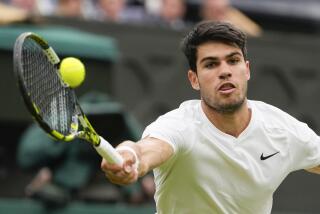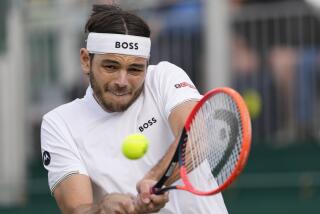They Love Listening to His Wimbledon Racket
Andre Agassi is gone. Pete Sampras never showed up. But John McEnroe at Wimbledon is a tradition that grows and grows, nurtured much like the storied grass courts themselves, with attentive English care and a bit of fertilizer.
Behind a microphone, McEnroe remains pretty much what he has been all along -- interesting, opinionated, an asset to any telecast on either side of the Atlantic. But there is no doubt McEnroeâs media image gets an upgrade every time he boards that annual flight to London, freed of the baggage that has slumped his shoulders in the States in recent years.
Americans are still too familiar with McEnroeâs botching of his long-coveted Davis Cup captaincy, his torturous turn as host of the unwatchable game show âThe Chair,â and his remarkably self-absorbed autobiography. How could he quit on the Davis Cup team after berating Sampras and other American players for doing the same? How could he take a look at the absurdly low concept of âThe Chairâ and walk away thinking, âYup, good career move.â?
Backlash was inevitable, and some critics hit at McEnroe the tennis analyst. Onetime admirers began carping about McEnroeâs turning shrill and self-referential. He never slipped lower than No. 2 among active tennis commentators, jockeying for position with friend and foil Mary Carillo, but it was as if Mac the Mike were being swallowed by his missteps away from the booth.
In England, at Wimbledon, McEnroe is lord of all media. His work for the BBC -- an association that seemed as implausible as pigs flying over Centre Court during his playing days -- has received raves. His byline appears in the Sunday Telegraph, his opinions are quoted in other newspapers across the land. The BBCâs Web site features a downloadable âDesktop McEnroe,â which involves a cartoon Mac popping up on your screen to chirp âYou cannot be serious!â and provide tournament updates.
McEnroe has become our end of the cultural sportscasting exchange with England. When a U.S. network wants to elevate the tone of its Grand Slam golf coverage, BBC legend Peter Alliss is brought in for an hour or two. The Outdoor Life Network employs British cycling experts Phil Liggett and Paul Sherwen to monitor the Tour de France. ABC and ESPN wish they had one soccer announcer half as polished as Sky Sportsâ Martin Tyler.
In turn, McEnroe offers the Brits brashness, restlessness and unpredictability. When McEnroe, reviled as Johnny Rotten in Wimbledons past, upbraided Greg Rusedski for his second-round tantrum against Andy Roddick, the Independent wrote about âhow lucky the BBC were to have John McEnroe in the booth when Rusedski rocked up his storm.â
The headline over the review read: âMac the mouth -- the very best of men at the very best of times.â
Scotlandâs national newspaper, the Scotsman, summed up McEnroeâs popularity in the UK: âMcEnroe has been deified as a commentator simply because he was an alien ingredient in the BBCâs stale recipe, a pundit who was prepared, now and then, to throw in an opinion with some force behind it.â
BBC America keeps shipping us comedies funnier that anything we can produce -- âThe Office,â âManchild,â âCoupling.â
America responds by shipping over McEnroe to entertain English viewers with this assessment of Todd Martin, king of the gut-busting five-setter: âTodd doesnât stay in a house when heâs here. He stays in a hospital.â
Or when he listens to a viewerâs e-mail to BBCâs âToday at Wimbledonâ program, stating, âWhat is wrong with these farcical umpires? In more than 30 years of watching tennis, I have never seen such an obvious point that had to be replayed.â
âHey,â McEnroe replied, âdidnât you see any of my matches?â
At the same time, the BBC seems to be rubbing off on McEnroe. On Saturday and Monday with NBC, McEnroe sounded more restrained and more focused, without sacrificing much of his trademark feistiness.
Ted Robinson was speaking admiringly about Agassiâs not wanting to discuss the ATP-Grand Slams dispute during Wimbledon -- âthe brewing unrest amongst the players who wish to get a bigger cut of money from the four Slamsâ is how Robinson worded it. McEnroe bristled.
âThatâs also, by the way, misrepresenting the playersâ position,â McEnroe said. âLetâs hope itâs not simply about an increase in prize money.... I know this is hard to believe, but you canât always believe what you read.â
McEnroe said he hoped the players were also fighting for big-picture issues such as scheduling and pensions.
Pension issues, Carillo countered, are still about money.
The threesome parried the issue around awhile. McEnroe found himself double-teamed -- triple-teamed if you counted the graphic listing the giant payouts for menâs and womenâs quarterfinalists and beyond.
âYouâre talking about a place, here at Wimbledon, where theyâre making, for these two weeks alone, in excess of $75-, $80 million,â McEnroe shot back before touching on such old favorite griping points as Davis Cup, the Olympics and tennisâ lack of a commissioner.
âDonât go there,â Robinson said, half-jokingly.
McEnroe laughed and retreated.
âIâm out of my allotted time.â
A few minutes later, McEnroe was praising NBC for its new hard-rock intro music.
âI want to say, the music is improving quite nicely at NBC,â he said. âA little rock and roll [at Wimbledon].... A combination of tradition and some edge.â
Not unlike the combination that has made McEnroe, every summer, Englandâs media figure of the fortnight.
More to Read
Go beyond the scoreboard
Get the latest on L.A.'s teams in the daily Sports Report newsletter.
You may occasionally receive promotional content from the Los Angeles Times.










